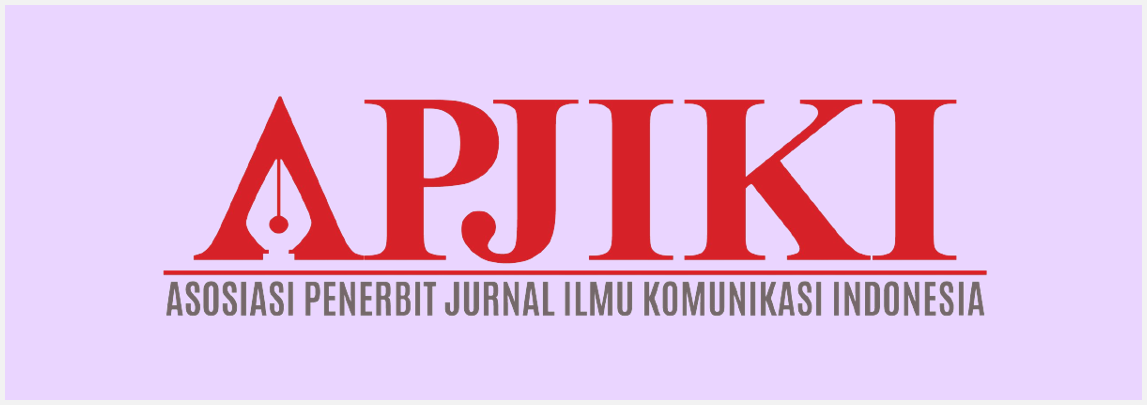MOTIF MAHASISWA KOTA SURABAYA DALAM MENGGUNAKAN REUSABLE PRODUCT .
Abstract
Keywords
Full Text:
PDF (Bahasa Indonesia)References
Bachtiar, H., Hanafi, I., & Rozikin, M. (2015). PENGEMBANGAN BANK SAMPAH SEBAGAI BENTUK PARTISIPASI MASYARAKAT DALAM PENGELOLAAN SAMPAH (Studi Pada Koperasi Bank Sampah Malang. Administrasi Publik, 3.
Badan Pusat Statistik Jawa Timur. (2019). Jumlah perguruan tinggi mahasiswa dan tenaga edukatif negeri dan swasta di bawah kementrian riset teknologi dan pendidikan menurut kabupaten kota di jawa timur 2018-2019. Retrieved from https://jatim.bps.go.id/
Chunnimah, Q. I. (2020). Implementasi Community Based Social Marketing dalam Pengelolaan Sampah Mandiri Masyarakat kota Surabaya. Ilmu Komunikasi, 2.
divers clean action. (2018). #NoStrawMovement is Finally Launched. Retrieved from https://www.diverscleanaction.org/ocean/viewnews
Effendi, R. (2012). HUBUNGAN BUDAYA ORGANISASI DAN PENGHARGAAN TERHADAP MOTIVASI KARYAWAN : STUDI KAUSAL TERHADAP KARYAWAN UNIVERSITAS MEGOUPAK TULANG BAWAN. Ilmu Ekonomi, 10.
Fikri, A. (2010). Dressed to Kill: Menakar Eksistensi Distri Sebagai Simbol Perlawanan Gaya di Yogyakarta. Universitas Islam Negeri Sunan Kalijaga.
Hutagalung, V. (n.d.). HUBUNGAN ANTARA TERPAAN IKLAN BILLBOARD ERHA CLINIC DENGAN MOTIVASI PRIA MENGGUNAKAN PELAYANAN ERHA CLINIC DI SURABAYA.
Lisma, N. (2016). Analisis Perilaku Konsumsi Mahasiswa Ditinjau Dari Motif Bertransaksi (Studi Kasus pada Mahasiswi S1 Pendidikan Ekonomi Fakultas Ekonomi Universitas Negeri Malang Angkatan Tahun 2012). Pendidikan Ekonomi, 9.
Listiyanto. (2013a). SUMBANGAN MOTIVASI DAN KONDISI FISIK SISWA TERHADAP KETERAMPILAN BERMAIN BOLA VOLI PUTRA DALAM KEGIATAN EKSTRAKURIKULER DI SMA NU AL MA’RUF KUDUS TAHUN 2013. UNIVERSITAS NEGERI SEMARANG.
Listiyanto, A. (2013b). SUMBANGAN MOTIVASI DAN KONDISI FISIK SISWA TERHADAP KETERAMPILAN BERMAIN BOLA VOLI PUTRA DALAM KEGIATAN EKSTRAKURIKULER DI SMA NU AL MA’RUF KUDUS TAHUN 2013. Unversitas Negeri Semarang.
Mahmud, Z. (2019). Surabaya dan Jakarta mana yang lebih baik tangani sampah. Retrieved from https://nationalgeographic.grid.id/
Manongko, A. (2018). Green Marketing. Manado: Yayasan Makaria Waya.
Mauch, C. (2016). A Future Without Waste? Zero Waste in Theory and Practice. California: Rachel Carson Center.
Meirita, N. (2019). ANALISIS PENGARUH PERILAKU KONSUMEN, MARKETING MIX, DAN LABEL HALAL TERHADAP KEPUTUSAN PEMBELIAN PRODUK DI INDOMARET KOTA SALATIGA. Institut Agama Islam Negeri Salatiga.
Muharram, N., & Lusianti, S. (2018). SURVEI MINAT DAN MOTIVASI SISWA PUTRA DALAM MENGIKUTI MATA PELAJARAN PENDIDIKAN JASMANI DAN KESEHATAN DI SMP 1 PGRI KEDIRI TAHUN AJARAN 2017/2018. Universitas Nusantara PGRI Kediri.
National Oceanic Atmospheric Administration. (2016). Marine Debris-Its Journey to Lake Erie. Retrieved from https://www.noaa.gov/
Nawangsari, E. (2017). DINAMIKA GOVERNANCE. JURNAL DINAMIKA GOVERNANCE, 7.
Novitasani, L. (2014). PERUBAHAN GAYA HIDUP KONSUMTIF PADA MAHASISWA URBAN DI UNESA. Sosiologi, 2.
Pratiwi Rizky. (2019). HUBUNGAN GAYA HIDUP HEDONIS DENGAN PERILAKU KONSUMTIF PRODUK SKINCARE PADA MAHASISWI UNIVERSITAS MEDAN AREA FAKULTAS PSIKOLOGI. Medan Area.
Putu, A. (2020). Komunitas nol sampah sebut Surabaya butuh aturan diet plastik.
Rosana, E. (2015). MODERNISASI DALAM PERSPEKTIF PERUBAHAN SOSIAL, 10.
Sa’diyah, A. (2016). Perilaku Pemanfaatan Perpustakaan Kafe (Library Cafe) Sebagai Gaya Hidup (Life style) Masyarakat Kota Surabaya. Airlangga.
Septiana, A. (2015). ANALISIS PERILAKU KONSUMSI DALAM ISLAM. Ekonomi Syariah, 1.
Shafrini, R. (2007). Gambaran Self-Esteem dan Gaya Hidup Dewasa Muda Penghuni Apartemen. Universitas Islam Negeri Syraif Hidayatullah.
Sugiyono. (2018). Metode Penelitian Kuantitatif. bandung: alfabeta.
Tarigan, D. (2015). KAJIAN GAYA HIDUP MASYARAKAT DI KELURAHAN BAHU KECAMATAN MALALAYANG KOTA MANADO. E-Journal “Acta Diurna,” 4.
The world counts. (2020). Number of plastic bag procuced. Retrieved from https://www.theworldcounts.com/challenges/planet-earth/waste/plastic-bags-used-per-year
Zero Waste International Alliance. (2018a). http://zwia.org/zero-waste-hierarchy/. Zero Waste International Alliance. Retrieved from http://zwia.org/zero-waste-hierarchy/
Zero Waste International Alliance. (2018b). Zero Waste Definition. Retrieved from http://zwia.org/zero-waste-definition/
DOI: https://doi.org/10.36914/jikb.v6i1.407
Refbacks
- There are currently no refbacks.
Copyright (c) 2020 Jurnal Ilmu Komunikasi dan Bisnis
Publisher: Sekolah Tinggi Ilmu Komunikasi dan Sekretari Tarakanita Copyright








